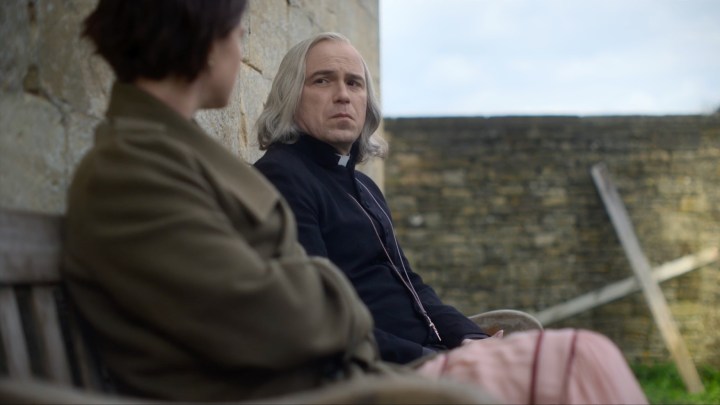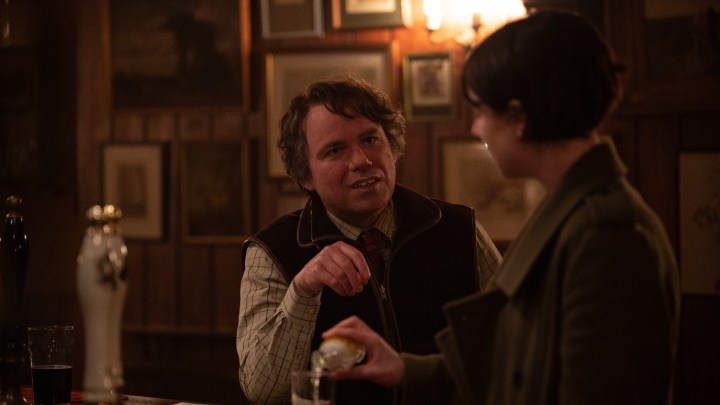When a film poses complicated questions, is it obligated to answer any of them? That’s going to become a popular topic of discussion around Men, the latest thriller from Ex Machina and Annihilation filmmaker Alex Garland, which delivers a thought-provoking exploration of trauma, gender dynamics, and primeval fear through the lens of the horror genre.
Written and directed by Garland, the film casts Oscar nominee Jessie Buckley (The Lost Daughter) as a woman who books a solo vacation in a rural English village after the death of her husband, only to encounter something sinister lurking in the countryside. The nature of that threat, and how it relates to the strangely similar men we see all around her, are just a few of the mysteries at the heart of Garland’s terrifying film.

Creation, gender, and surrealism have become recurring themes in Garland’s projects, from his deep dive into our relationship with artificial intelligence in 2014’s Ex Machina to the existential, extraterrestrial mystery of 2018’s criminally underappreciated Annihilation. He’s never been one to shy away from heavy subject matter, and Men might be his heaviest, most complex film so far.
Garland has a knack for threading intricately beautiful elements with a sense of sinister foreboding, and that talent is on full display in Men. Scenic shots of the English countryside are filled with an unease suggesting some unknowable terror just over the horizon, and every perfectly framed, evocative shot has you looking for some barely perceptible threat lurking in the shadows, preparing to pounce.
Men is Garland’s most terrifying (both subtly and overtly) directorial project to date, and he shows a scary-good grasp of the horror genre’s conventions, tropes, and range.
In the film’s lead role, Buckley strikes the perfect balance between being a desperate victim of the increasingly creepy events transpiring around her and a woman who simply has — to put it in the most timely sense — no more fucks to give about being a target. Her initial, primal fear gives way to a visible resignation that if she wants this ordeal to end, she’ll need to be the one to end it. It’s an arc that’s easy to convey in words, but less so on the screen, and Buckley (through Garland’s camera) gives it all the nuance necessary to make it feel organic.
Buckley isn’t alone in delivering a powerful performance, either.

Playing multiple roles in the film, Our Flag Means Death and The Imitation Game actor Rory Kinnear showcases a chameleon-like ability to not only slip into more than a dozen different characters, but act alongside himself in various scenes convincingly. The nature of his multicharacter presence is either a spoiler or one of the film’s biggest mysteries, depending on how you interpret it, but the subtle ways he differentiates one character from the next beyond any makeup, prosthetics, or wardrobe adds to one of the film’s most unnerving elements.
Kinnear has played multiple characters in Penny Dreadful and Our Flag Means Death in the past, but Men pushes the multirole performance to a degree that would test any actor, regardless of how comfortable they are with that kind of project — and Kinnear pulls it off perfectly.
While the film plays like a traditional horror story across its first two acts, Men takes some of its biggest, experimental swings in a third act likely to generate plenty of discussion among audiences.

Without revealing anything about the events that unfold in the film’s final moments, Men saves its most surreal and visually stunning set piece for last. It’s a scene that takes everything it’s hinted at, poked, and otherwise nudged into focus over the last hour and collapses it all into a spectacularly visceral sequence. It’s the sort of scene that will stay with audiences long after they leave the theater, and Garland milks every ounce of frighteningly graphic — and in some ways, cathartic — terror from it.
What Garland doesn’t do, however, is provide any concrete answers to the questions posed by that scene or much of the story leading up to it.
Anyone familiar with his previous work probably won’t be surprised by the mystery he leaves in the film’s wake. Garland’s desire to pose questions he doesn’t explicitly answer about the themes, the story, and even what’s real and what isn’t in the context of the character’s experiences is intentional. It’s a hallmark of his projects, and it’s at its most pronounced level so far in Men, which declines to confirm whether the eyes you see the story unfold through — those of Buckley’s character — are those of a reliable narrator. It encourages you to interpret its message myriad ways, and in doing so, it hammers home the subjectivity of what we take away from the film.

Garland is a fascinating filmmaker, willing to take big leaps with his storytelling and even bigger risks, leaving open threads that most filmmakers would feel compelled to tie, and experimenting with concepts and scenes that many would deem unfilmable. Men exemplifies all of those traits, and it does so with the fearlessness that these kinds of projects need to become the best they can be.
While it’s open-ended narrative and themes might turn off some audiences, Men is the sort of film that leaves nothing on the table, and its willingness to explore its themes and concepts as far as it can go with them makes it something special. All of that is bolstered by excellent performances from its small but incredibly efficient cast, who throw themselves into both the story and the ideas behind it.
In the end, Men delivers a powerful reminder that, sometimes, the way a question is asked can be more fascinating than any answers we could possibly receive.
Alex Garland’s Men premieres May 20 in theaters.



